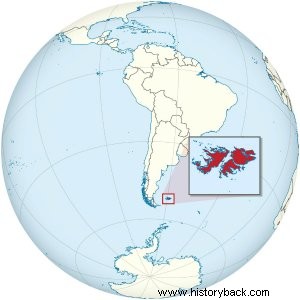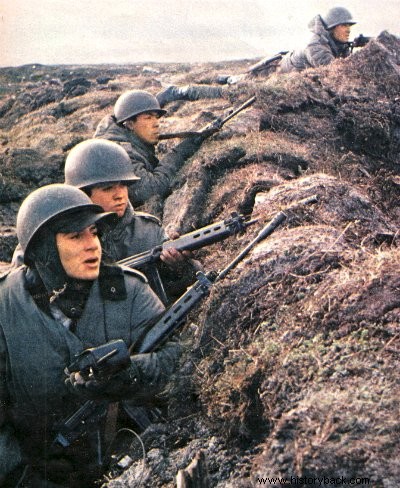The Falklands War (Falklands War or Guerra de las Malvinas ) was aconflict that took place in 1982 between Great Britain and Argentina . The aim was to gain possession of the archipelago, which is located 464 kilometers off the Argentine coast.
There were two months of war that began on April 2 and lasted until June 14, 1982. Finally, the British won and remained in possession of the territory.
 The Falkland Islands are 464 km off the Argentine coast
The Falkland Islands are 464 km off the Argentine coast
Causes
The conflict was initiated by the order of former Argentine dictator Leopoldo Galtieri (1926-2003). He ordered the occupation of the islands, which had been in British possession since 1833.
The justification was the unification of the islands to the Argentine territory. In the dictator's assessment, Argentine territory should be indivisible. Possession by a foreign nation meant a threat to sovereignty.
Abstract
On April 2, 1982, the Argentine government ordered the landing of a joint force of the Navy and the Army on the island of Port Stanley.
"Operation Rosario", as it was called, had the objective of expelling the military and the representatives of the English government.
The resumption took place with little resistance and the island was renamed Puerto . The occupation was celebrated in the streets of Argentina. Thousands occupied the front of Casa Rosada, the seat of the Argentine government in Buenos Aires, as a sign of support for the end of 149 years of British presence in the region.
On the same day, the British Crown announced the severing of relations between Great Britain and Argentina. British Prime Minister Margareth Thatcher (1925-2013) launched a powerful counterattack. There were 27,000 soldiers and 111 warships.
The UN Security Council (United Nations) was also called upon. Argentina was diplomatically isolated and had a visible military disadvantage.
The Argentine action was also posed as an opportunity for Soviet expansion in South America. The result would be a counter-coup within a dictatorship supported by the United States of America.
The US was the main supporter of the British through the provision of weapons and information by satellite. In addition to logistical support, on April 8, the Panama Canal opened for the passage of 111 British ships.
Support from Brazil
The Argentine government appointed Brazil as its representative in Great Britain. In practice, action could be translated as moral support.
Brazil recognized the possession of the island by the Argentines since 1833, but it has in Great Britain an important trading partner.
End of War
The war ended after successive UN peace negotiations. Even Pope John Paul II called for peace on a visit to both countries.
With no agreement, the conflict ended on June 14, 1982. The United Kingdom regained the territory, and since then no other armed conflict has questioned the outcome.
Consequences
 Argentine soldiers in trenches; 255 died in the war
Argentine soldiers in trenches; 255 died in the war
In 75 days of war, 649 Argentine soldiers, 255 British and three civilians died. The Falklands War overthrew the Military Junta that ruled the country. That's how Argentina restored democracy.
On the British side, the victory in the confrontation was an efficient electoral propaganda. After the war, Margaret Thatcher won the 1983 elections.
War of Falklands – 2012
30 years after its inception, the dispute over ownership of the Falkland Islands was the subject of a diplomatic incident recorded in 2012.
This time, former Argentine President Cristina Kirchner accused Britain of colonialism for maintaining sovereignty over the islands.
At the time, former British Prime Minister David Cameron replied that the situation would not change. The then prime minister claimed that the people of the Falklands are self-determining British and that will would be respected.
Learn more:Imperialism
